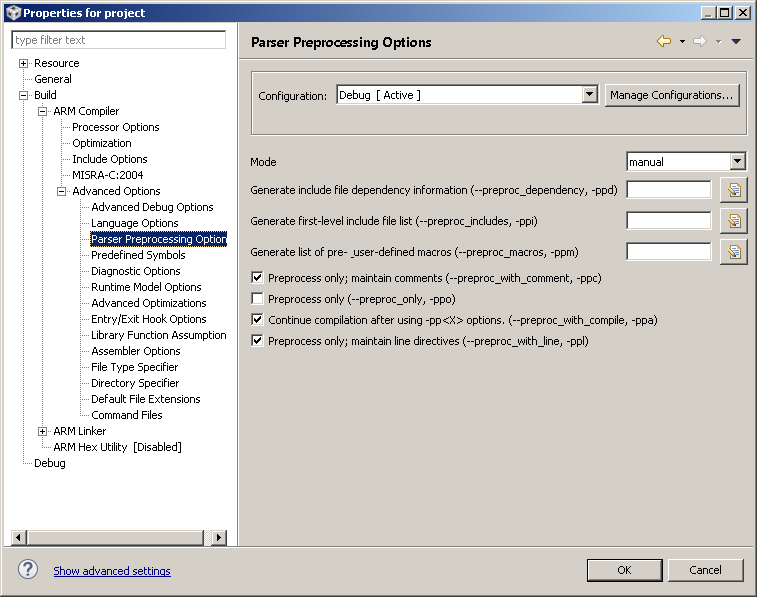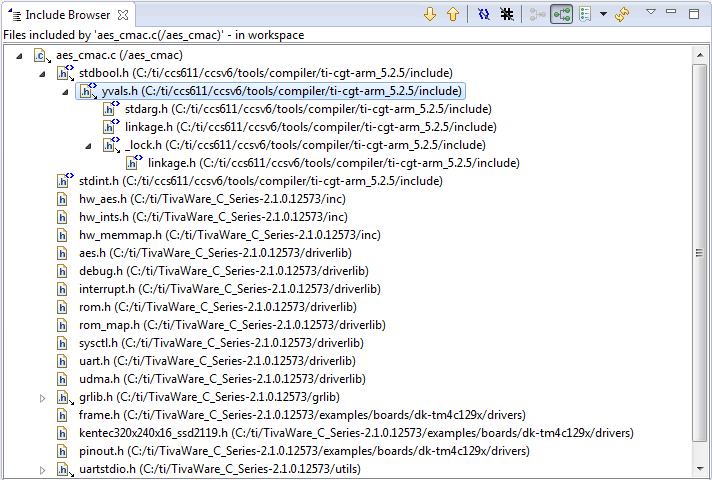I am very confused about what is included in a compile and what is excluded
I am looking at .c file that is being compiled that includes a reference to a .h file.
/*
* ====================== Includes ============================================
*/
#include <inc/hw_memmap.h>
#include <inc/hw_ints.h>
#include <driverlib/ioc.h>
#include <driverlib/udma.h>
#include <xdc/std.h>
#include <xdc/runtime/System.h>
#include <ti/sysbios/family/arm/m3/Hwi.h>
#include <ti/sysbios/family/arm/cc26xx/Power.h>
#include <ti/sysbios/family/arm/cc26xx/PowerCC2650.h>
#include <ti/drivers/PIN.h>
#include "Board.h"
/*
* ========================= IO driver initialization =========================
* From main, PIN_init(BoardGpioInitTable) should be called to setup safe
* settings for this board.
* When a pin is allocated and then de-allocated, it will revert to the state
* configured in this table.
*/
PIN_Config BoardGpioInitTable[] = {
#if BOARD_SALU
Board_LED1_EN | PIN_GPIO_OUTPUT_EN | PIN_GPIO_LOW | PIN_PUSHPULL | PIN_DRVSTR_MAX, /* LED initially off */
Board_LED2_EN | PIN_GPIO_OUTPUT_EN | PIN_GPIO_LOW | PIN_PUSHPULL | PIN_DRVSTR_MAX, /* LED initially off */
Board_LED3_EN | PIN_GPIO_OUTPUT_EN | PIN_GPIO_LOW | PIN_PUSHPULL | PIN_DRVSTR_MAX, /* LED initially off */
Board_LED4_EN | PIN_GPIO_OUTPUT_EN | PIN_GPIO_LOW | PIN_PUSHPULL | PIN_DRVSTR_MAX, /* LED initially off */
Board_SENS_LED1_EN | PIN_GPIO_OUTPUT_EN | PIN_GPIO_LOW | PIN_PUSHPULL | PIN_DRVSTR_MAX, /* LED initially off */
Board_SENS_LED2_EN | PIN_GPIO_OUTPUT_EN | PIN_GPIO_LOW | PIN_PUSHPULL | PIN_DRVSTR_MAX, /* LED initially off */
Board_PHOTO_EN | PIN_GPIO_OUTPUT_EN | PIN_GPIO_LOW | PIN_PUSHPULL | PIN_DRVSTR_MAX, /* Initially off */
Board_LDO_EN | PIN_GPIO_OUTPUT_EN | PIN_GPIO_LOW | PIN_PUSHPULL | PIN_DRVSTR_MAX, /* Initially off */
Board_ECG_SDN | PIN_GPIO_OUTPUT_EN | PIN_GPIO_LOW | PIN_PUSHPULL | PIN_DRVSTR_MAX, /* Initially off */
Board_SPI1_ACCEL_CS | PIN_GPIO_OUTPUT_EN | PIN_GPIO_HIGH | PIN_PUSHPULL | PIN_DRVSTR_MAX, /* Initially high */
Board_SPI1_FLASH_CS | PIN_GPIO_OUTPUT_EN | PIN_GPIO_HIGH | PIN_PUSHPULL | PIN_DRVSTR_MAX, /* Initially high */
Board_SPI1_FLASH_HOLD | PIN_GPIO_OUTPUT_EN | PIN_GPIO_HIGH | PIN_PUSHPULL | PIN_DRVSTR_MAX, /* Initially off */
Board_PWR_INT | PIN_GPIO_OUTPUT_DIS | PIN_INPUT_EN | PIN_NOPULL, /* Input, no pull */
Board_ACCEL_INT | PIN_GPIO_OUTPUT_DIS | PIN_INPUT_EN | PIN_NOPULL, /* Input, no pull */
#else...
The define "BOARD_SALU" is in "Board.h"
#ifndef __BOARD_H__
#define __BOARD_H__
#define BOARD_SALU (1)
#ifdef __cplusplus
extern "C" {
#endif
/** ============================================================================
* Includes
* ==========================================================================*/
#include <ti/drivers/PIN.h>
#include <driverlib/ioc.h>
/** ============================================================================
* Externs
* ==========================================================================*/
extern PIN_Config BoardGpioInitTable[];
... the reset of my board definitions
____
For some reason my Board.h file is completely ignored by the compiler. I can go into it and type junk and it is completely ignored.
But if you F3 on Board.h CCS finds the file.
What gives? How do I get the compiler to "see" my .h file?



